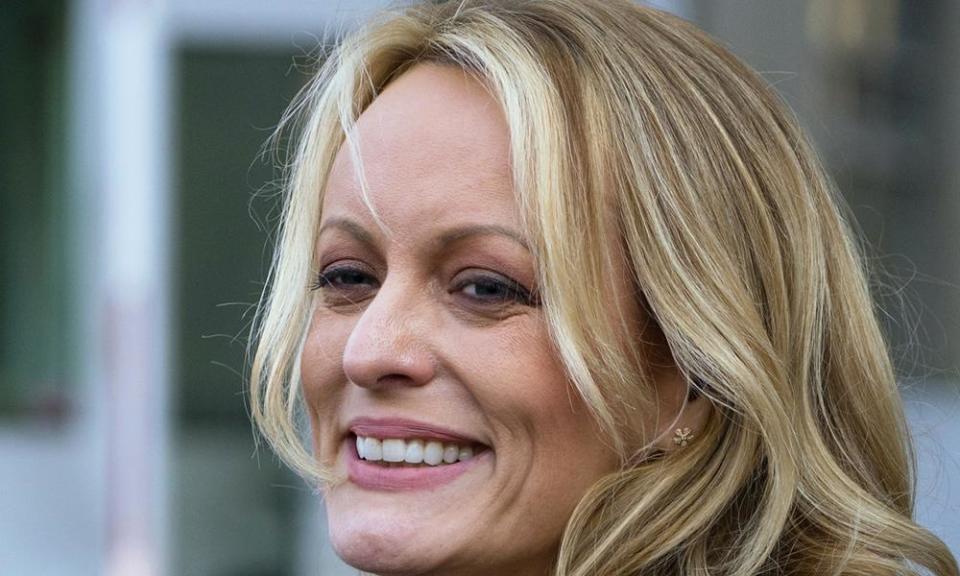Stormy Daniels: 'Little girl from Baton Rouge' posing big problem for Trump
A $130,000 payment in 2016 bought the porn star’s silence about an alleged affair but now spells trouble for the president

A year after Donald Trump’s inauguration, the Wall Street Journal reported that his personal lawyer, Michael Cohen, had arranged a hush payment of $130,000 to a pornographic film actor named Stormy Daniels.
At the time, the significance of the Daniels payment was hard to judge.
But ever since, Daniels’ importance as a Trump antagonist has steadily grown, to the point that her case poses, in the judgment of some analysts, an existential threat to the Trump presidency.
How did an alleged affair between Trump and Daniels in 2006 produce a showdown that has entered a salacious new phase with the imminent publication of Daniels’ memoir, Full Disclosure, a copy of which was obtained by the Guardian?
In short, the efforts by Trump surrogates to silence Daniels on the eve of the 2016 election, while effective at the time, involved criminal behavior that attracted the attention of federal prosecutors. Cohen pleaded guilty last month to violating campaign finance laws in connection with the payment to Daniels. Trump then confirmed in a televised interview that he had reimbursed Cohen for the $130,000.
“If those payments were a crime for Michael Cohen,” said Lanny Davis, Cohen’s lawyer, “then why wouldn’t they be a crime for Donald Trump?”
Daniels was one of at least two women to have struck a deal with Trump or a close friend of Trump before the election. The former Playboy model Karen McDougal, who also alleges an affair with Trump, was paid $150,000 by the publisher of the National Enquirer for rights to her story, which was never printed.
Daniels, by her own description, was happy with the hush agreement, hoping that her alleged affair with Trump would remain a secret from her husband, whom she had never bothered to tell about it, she writes in her book: “I used the money to buy a new horse trailer, and I thought that was the end of it.”
But after the Journal story, Cohen mounted a campaign to intimidate Daniels, she charged in a lawsuit against the president in March 2018. The lawsuit, in which Daniels was represented for the first time by her lawyer Michael Avenatti, sought release from the hush agreement on the grounds that Trump had never signed it.
Ultimately, Trump and his legal representation signalled they would not seek to enforce the hush agreement. But the pressure by then was not coming from any story Daniels had to tell. It was coming from prosecutors who had parlayed an investigation of Cohen’s banking records into a wider investigation of alleged campaign finance violations by other members of the Trump Organization.
Daniels was born Stephanie Clifford and raised by a neglectful mother, she writes, in Baton Rouge, Louisiana. She began working in strip clubs in high school and eventually started appearing in pornographic films. In her memoir, Daniels describes herself as “a little girl back in Baton Rouge just trying to survive and spend time with my horses”.
She met Trump at a celebrity golf tournament in Lake Tahoe, California, where she had been invited to greet golfers between tees. He was impressed with her director’s credentials, she thought, and he sent his bodyguard, Keith Schiller, to invite her to dinner.
Daniels said that in his penthouse hotel room, Trump propositioned her, and she accepted. She stayed in touch with him, she said, because he had offered her a role on his reality show, The Apprentice.
The relationship took a turn after Trump began winning presidential primaries in 2016. Daniels writes that she feared for her daughter’s safety and her own, given the size of her alleged secret about the Republican nominee.
• This article was amended on 18 September 2018 to correct the date of the original Wall Street Journal report on the hush payment, which was published in January 2018, not during the presidential transition.

